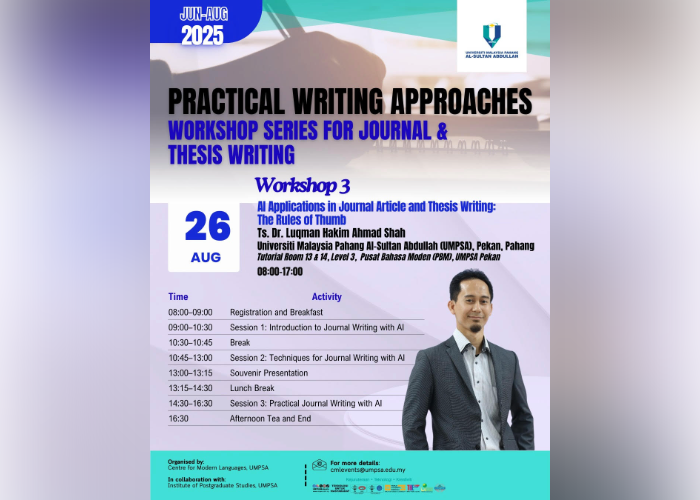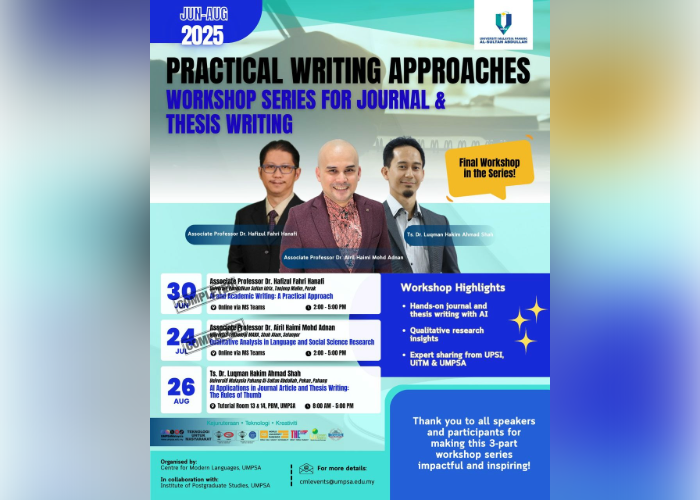PRACTICAL WRITING APPROACHES WORKSHOP EXPLORES GENERATIVE AI APPLICATIONS IN ACADEMIC RESEARCH AND WRITING
PEKAN, 26 AUGUST 2025 - The rapid advancement of generative artificial intelligence (AI) applications has reshaped the academic landscape, introducing innovative tools that support writers, researchers, and educators in unprecedented ways. As universities worldwide adapt to these technological shifts, discussions on the responsible and ethical integration of generative AI in research and academic writing have become increasingly vital. In response to this need, the Centre for Modern Languages (CML), Universiti Malaysia Pahang Al-Sultan Abdullah (UMPSA), successfully organised the third instalment of the Practical Writing Approaches Workshop Series held at CML Tutorial Rooms 13 and 14, UMPSA Pekan.
The full-day workshop, entitled “AI Applications in Journal Article and Thesis Writing: The Rules of Thumb”, was conducted by Ts. Dr. Luqman Hakim Ahmad Shah. It attracted 66 participants, comprising primarily postgraduate students, CML staff, and representatives from other UMPSA faculties. Running from 8:00 a.m. to 5:00 p.m., the session combined theoretical discussions with hands-on practice, creating a highly interactive and practical learning experience.
Throughout the workshop, Dr. Luqman emphasised the ethical dimensions of generative AI usage in academic work, reminding participants of the importance of maintaining academic integrity and transparency when integrating generative AI applications into their writing process. He cautioned against overreliance on AI-generated content, underscoring that while such tools can support research, critical thinking and originality remain the researcher’s responsibility.
Beyond ethics, participants were introduced to cutting-edge AI applications that are reshaping research practices. Among these were SciSpace, a platform that simplifies access to scholarly content and streamlines formatting processes, and Consensus, an AI-powered search applictaion that synthesises research findings to help students evaluate literature more efficiently. Through guided demonstrations and practical exercises, participants explored these tools and learned how to apply them effectively in their own research contexts.
One of the participants, Aisyah Khaleeda Rosli, a PhD student, reflected on the session: “As a doctoral researcher, I’ve come across AI before, but I never really thought of using it in the way the speaker showed us. For example, I didn’t know that Scispace could reformat an entire paper into another journal’s style within minutes, something that usually takes me hours. That was eye-opening. I also discovered Consensus, and honestly, it feels like magic because it cuts down the time I spend searching for relevant literature. I get to learn how to organise my readings into a compact matrix, which makes reviewing so much easier. These are the kinds of things you wouldn’t usually get unless you join a workshop like this.”
Another participant, Raji Luqman, expressed his appreciation for the workshop, commending the speaker’s depth of knowledge, commitment, and generosity in sharing practical guidance. He noted that the session had greatly benefited him and extended heartfelt thanks to UMPSA, the CML staff, UMPSA postgraduate students, IPS, and all members of the organising team for their efforts in curating the workshop series. He described the initiative as a meaningful contribution to participants’ academic development and research journey.
Meanwhile, the Programme Director of the Practical Writing Approaches Workshop Series, Dr. Ezihaslinda Ngah, reflected on the significance of the session:
“We are very pleased to see such strong engagement from our postgraduate students and academic staff. Generative AI is undeniably changing the academic world, and it is our responsibility to ensure our students are equipped not just with the tools, but also with the ethical awareness to use them effectively. It is our hope that those who joined the workshop series will apply what they have learned into their academic writing.”
Before concluding, Dr. Luqman shared a personal insight from his own PhD journey, revealing the strategy that helped him stay focused and productive: the Pomodoro Technique, originally developed by Francesco Cirillo. He described it as his “secret weapon” for completing his doctoral studies, explaining how consistent use of the method improved his concentration and helped him maintain momentum throughout his research.
The workshop underscored the growing importance of generative AI literacy in academia, equipping participants with both the technical knowledge and ethical awareness needed to harness generative AI responsibly in journal and thesis writing. For many postgraduate students, the session provided valuable insights into navigating the complexities of research in a digital era.
In conclusion, the Practical Writing Approaches Workshop Series continues to serve as a vital platform for postgraduate students and academics to refine their scholarly writing skills. This third instalment, focusing on the role of generative AI in academic research and writing, not only enhanced participants’ technical abilities but also reinforced the values of originality, integrity, and scholarly excellence. As generative AI tools become more prevalent in higher education, initiatives such as this play an essential role in preparing researchers to use technology wisely and ethically in pursuit of academic success.
Written by: Amy Zulaikha Mohd Ali, Dr Ezihaslinda Ngah, and Mardhiyyah Zamani





